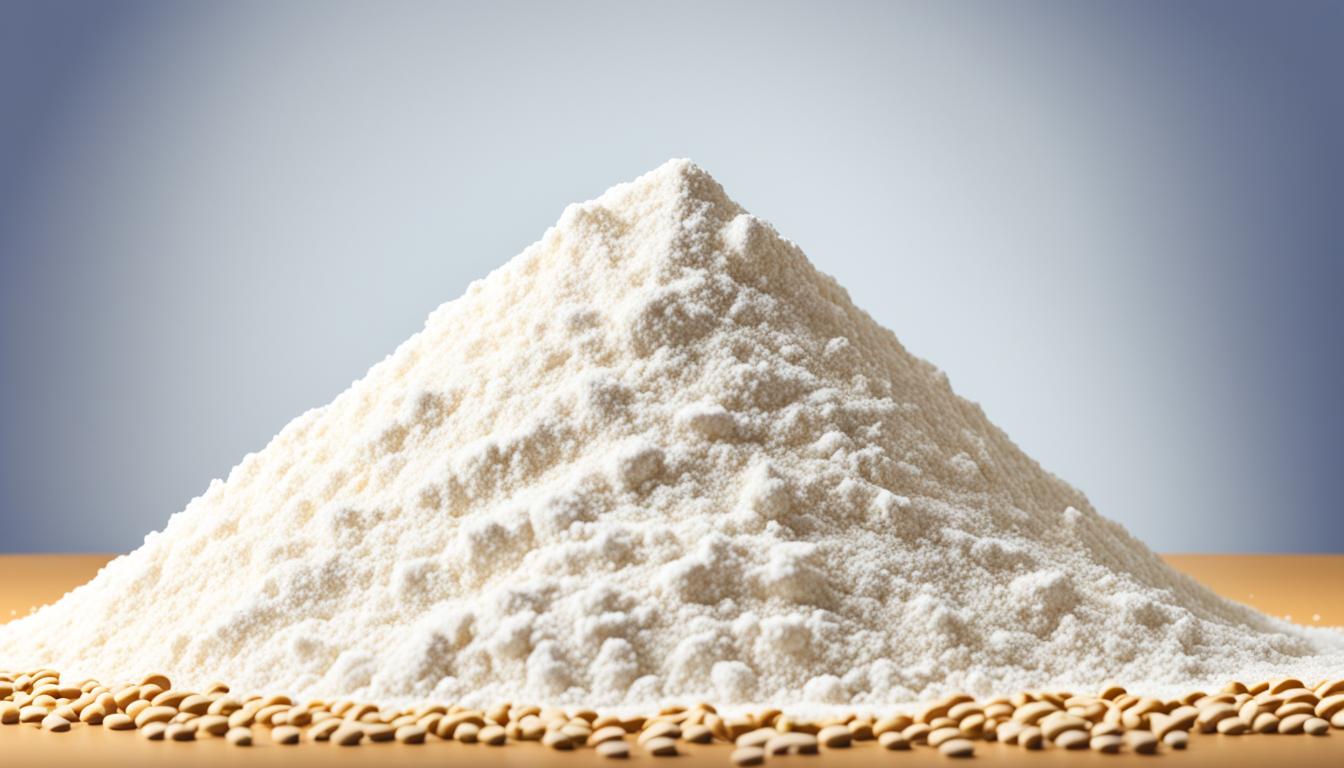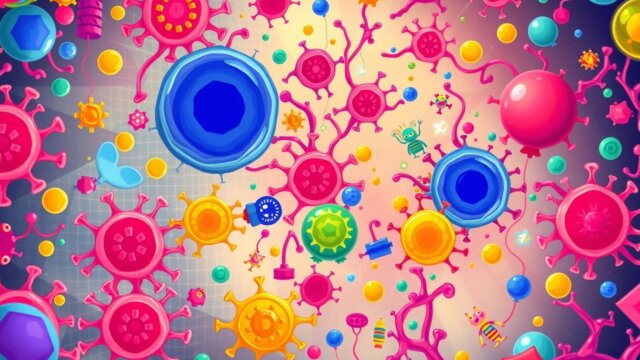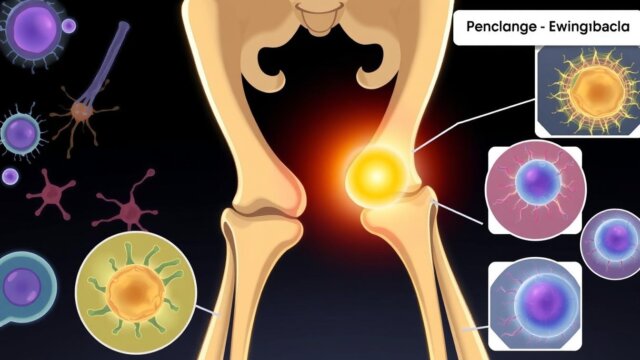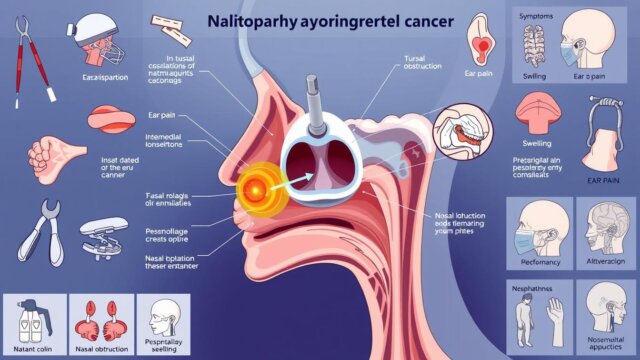FTC disclaimer: This post may contains affiliate links and we will be compensated if you click on a link and make a purchase.
The USDA says half of your daily grains should be whole grains. But a 2019 review in Advances in Nutrition found no strong proof that refined grains are bad. They say the link between refined grains and diseases might just be a mistake, not real.
White bread, a refined grain, gets a bad rap. Experts say eat mostly whole grains but it’s okay to enjoy some refined grains too.
Key Takeaways
- The USDA recommends making half of your daily grain intake whole grains.
- Scientific evidence does not support the idea that refined grains should be avoided.
- Refined grain products like white bread are often portrayed more negatively than warranted.
- Nutrition experts recommend a balanced approach, choosing minimally refined grains most of the time but allowing for some indulgence.
- Incorporating a variety of whole and refined grains can be part of a healthy, sustainable diet.
Understanding Grains: Whole vs. Refined
Grains are the dry seeds from grass-like plants like wheat, rice, and corn. Whole grains have the bran, germ, and endosperm, which are full of nutrients. Refined grains lose these parts, leaving only the endosperm.
This process takes away a lot of fiber, vitamins, minerals, and antioxidants found in whole grains.
The 2015-2020 Dietary Guidelines suggest eating half your grains as whole grains. Whole grains are full of nutrients and help prevent heart disease, type 2 diabetes, and some cancers. Refined grains don’t have these nutrients and are often not as healthy.
Eating enough whole grains is good for your health. Women eating 2 to 3 servings of whole-grain products daily were 30% less likely to have a heart attack or die from heart disease. Also, eating 70 grams/day of whole grains lowered the risk of death, heart disease, and cancer.
Knowing the difference between whole and refined grains helps you make better food choices. Adding more whole grains to your diet brings many health benefits.
Nutritional Differences: Whole vs. Refined
Whole and refined grains have big differences in nutrition. Whole grains like brown rice, oats, and whole wheat keep the bran and germ. Refined grains lose these parts, leaving just the starchy endosperm.
Whole grains are packed with fiber, vitamins, minerals, and antioxidants. Refined grains don’t have as much of these good nutrients. They are often enriched but still miss out on fiber.
Fiber and Nutrient Content
Whole grains have a lot more fiber than refined grains. For example, whole wheat flour has 600% more fiber than white flour. This fiber is good for your gut, blood sugar, and overall health.
Whole grains also have more vitamins and minerals like B vitamins, iron, and magnesium. Enriched refined grains don’t match the nutrition of whole grains.
Choosing whole grain options is better for your health. It can lower the risk of heart disease, some cancers, and type 2 diabetes. Aim for a mix of whole and refined grains for a healthy diet.
Health Benefits of Whole Grains
Eating whole grains is good for your health. Studies show it can lower the risk of heart disease, type 2 diabetes, obesity, and some cancers. This is thanks to the fiber, vitamins, minerals, and antioxidants in whole grains.
Just 3 servings of whole grains a day can cut heart disease risk by 22%. It can also lower stroke risk by 14%. Eating whole grains helps keep your weight healthy and reduces belly fat. Switching to whole grains can also lower type 2 diabetes risk.
Whole grains do more than just help with heart health. They are linked to a lower risk of colorectal, pancreatic, and gastric cancers. They also help prevent early death from any cause. Plus, they can reduce chronic inflammation, which is bad for your health.
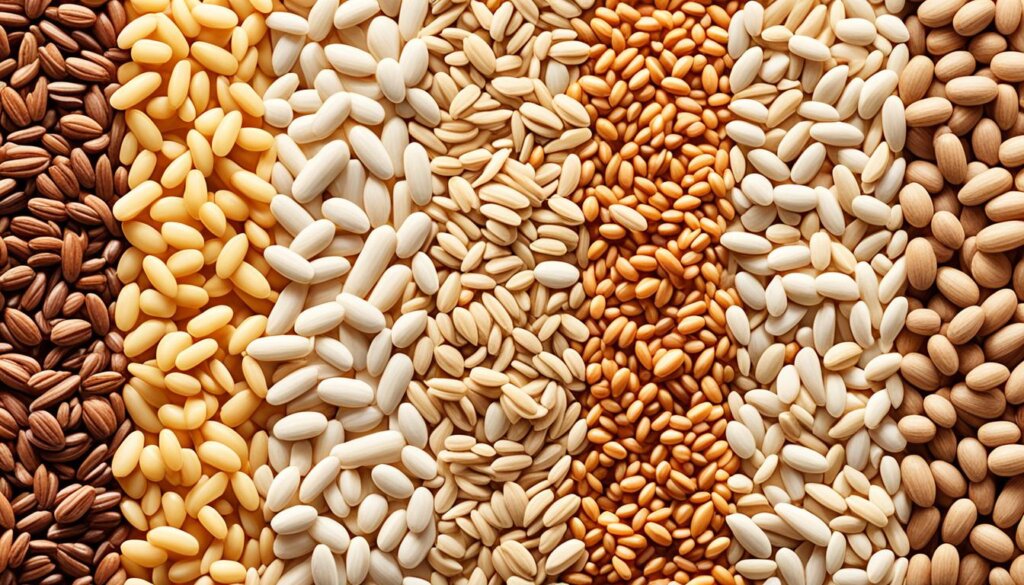
The Dietary Guidelines for Americans suggest eating at least half whole grains. Adding foods like brown rice, oatmeal, whole-wheat bread, and quinoa to your meals is a good idea. This way, you get many important nutrients.
Potential Downsides of Refined Grains
Whole grains are good for health, but refined grains have some downsides. They lose fiber and nutrients when the bran and germ are removed. This process cuts the grain’s protein and many nutrients by a lot. Since the late 1800s, most grains eaten worldwide are refined thanks to new mills. Enrichment adds back some nutrients, but not all, and studies link refined grains to health issues.
Refined grains might make you gain weight and become obese. Eating a lot of refined grains can lead to more fat. Also, a protein in wheat can make you eat more, adding 400 calories a day on average.
These grains can also mess with your blood sugar and increase the risk of type 2 diabetes. Foods like bread can make your blood sugar spike a lot. Eating too many refined grains can make you resistant to insulin and raise your blood sugar, which is bad for your heart and diabetes.
Refined grains might also cause inflammation. Eating a lot of flour can hurt nerve cells in your colon, affecting your digestion. Some people can be allergic or intolerant to grains like wheat because of more gluten in today’s wheat.

Even though refined grains are easy and cheap, knowing their downsides is important. Try to eat more whole, nutrient-rich grains for a balanced diet.
Refined Grains and Weight Management
Studies show that eating refined grains can lead to weight gain and obesity. This is because they have less fiber and can make blood sugar levels go up fast.
Whole grains are different. They are full of nutrients and fiber. This fiber helps you feel full and can help control your weight.
The Fiber Factor
Whole grains have more fiber than refined grains. Refined grains like white bread and pasta lose a lot of fiber and nutrients when processed. This can cause your blood sugar to go up and down quickly. This might make you hungry, want more food, and gain weight.
Nutrient | Whole Grains | Refined Grains |
|---|---|---|
Fiber | High | Low |
Protein | Moderate | Moderate |
Vitamins and Minerals | High | Moderate (often enriched) |
Antioxidants | High | Low |
The table shows how whole grains have more fiber than refined grains.
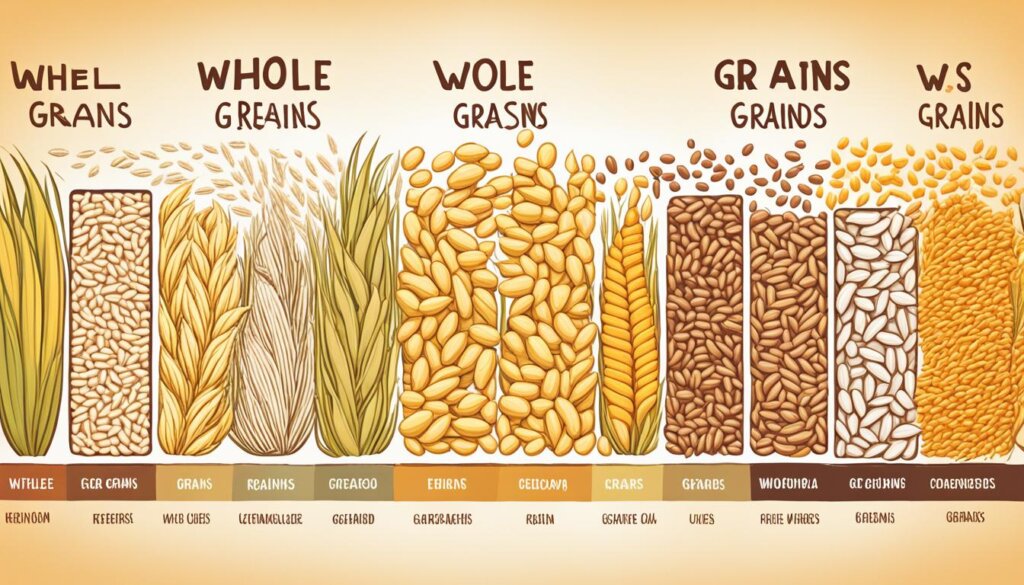
Choosing more whole grains and less refined grains can help your health and weight.
“Whole grain consumption is associated with a lower risk of type 2 diabetes, cardiovascular disease, and weight gain.” – Nutrition Research
Refined Grains and Blood Sugar Control
Choosing the right grains is key to managing blood sugar. Refined grains don’t have much fiber, unlike whole grains. This means they can cause blood sugar to go up fast. This can lead to insulin resistance and increase the risk of type 2 diabetes.
Whole grains keep the whole grain kernel, including bran, germ, and endosperm. They are full of fiber, which slows down how fast carbs are digested and absorbed. This leads to a more stable blood sugar level. Studies show eating more whole grains can lower the risk of type 2 diabetes.
Whole Grain | Fiber Content (per serving) |
|---|---|
Farro | 7 g (25% DV) |
Quinoa | 5 g (18% DV) |
Wheat Berries | 6 g (21% DV) |
Barley | 6 g (21% DV) |
If you have diabetes or are at risk, eating more whole grains can help manage blood sugar. This simple change can lead to more stable blood sugar levels and lower diabetes risks.
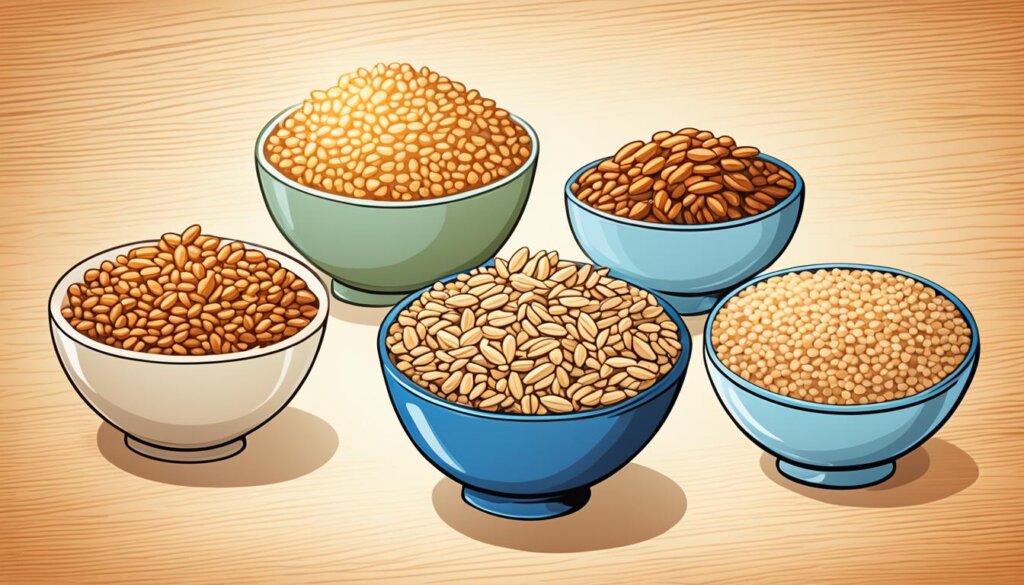
“Whole grains are packed with fiber, helping to lower cholesterol and reduce the risk of heart disease.”
Refined Grains and Inflammation
Eating a lot of refined grains can hurt your body’s fight against inflammation. These grains, like white bread and white rice, lose their good parts during processing. This makes them linked to more inflammation in the body.
On the other hand, whole grains are full of good stuff like vitamins and antioxidants. They help fight inflammation. Eating a lot of whole grains can lower the risk of type 2 diabetes, high blood pressure, and heart disease. Foods like amaranth and brown rice are great because they’re full of fiber and nutrients.
Some whole grains, like quinoa, can even help stop inflammation in the body. Other good ones include sorghum and whole oats, which are good for your health and weight.
When buying packaged foods, check the ingredients for whole grains. Don’t just look for “multigrain” or “wheat” labels, as they might not mean whole grains. Choosing whole-grain foods can help lower inflammation and improve your health.
“Whole grains are rich in B vitamins and antioxidants, high in fiber, contributing to lower risks of type-2 diabetes, high blood pressure, and heart disease.”
Studies show a strong link between refined grains and inflammation. Whole grains are linked to less heart disease, type 2 diabetes, and other inflammation-related issues. But, eating more refined grains can lead to more inflammation and type 2 diabetes.
This shows why it’s key to eat fewer refined grains and more whole grains. Making smart food choices can help reduce inflammation and lower the risk of chronic diseases.
Refined Grains and Heart Health
Many studies show a link between refined grains and a higher risk of heart disease. Refined grains don’t have the fiber and nutrients of whole grains. This could be why they’re linked to heart disease.
Eating more refined grains can lead to higher cholesterol and heart disease risk factors. On the other hand, whole grains can lower heart disease risk. They help with blood pressure, inflammation, and cholesterol.
A study in Iran showed that eating more refined grains raised the risk of heart disease. But eating more whole grains lowered this risk. A big study with over 148,000 people found that eating a lot of refined grains was linked to more heart problems and death.
To keep your heart healthy, swap refined grain foods for whole grain ones. The Whole Grains Council suggests choosing products with the 100% Stamp or Whole Grain Stamp for enough whole grain.
Eating a diet full of whole grains and cutting down on refined grains can help your heart health. It can also lower your risk of cardiovascular disease.
“The 2019 ACC/American Heart Association Guideline on the Primary Prevention of Cardiovascular Disease recommends a diet emphasizing the intake of vegetables, fruits, legumes, whole grains, and fish to reduce heart disease risk factors.”
Gluten and FODMAP Considerations
Some people need to watch what grains they eat. Grains like wheat, barley, and rye have gluten. This can be a problem for those with celiac disease or gluten sensitivity. Also, some grains have a lot of FODMAPs, which can make digestive issues worse for people with IBS.
Gluten Concerns
About 0.4% to 0.95% of people worldwide have celiac disease. This condition makes the small intestine react to gluten. People with celiac disease should not eat more than 50 mg of gluten a day. But, not all digestive problems come from celiac disease. Some people have non-celiac gluten sensitivity, which affects around 8.1% of kids.
Even without celiac disease or sensitivity, some people choose to eat gluten-free. But, only about 1.2% of people in the U.S. do this.
FODMAP Considerations
Some grains are also high in FODMAPs, which can make digestive issues worse. Wheat is a big part of many diets and has a lot of FODMAPs. When starting a low-FODMAP diet for IBS, wheat was avoided at first. But, now, small amounts of some wheat products are okay for most people with IBS.
Everyone reacts differently to FODMAPs, so it’s best to try different foods to see what works. Foods like dried garlic, fruits, and veggies with high FODMAPs should be eaten in small amounts or avoided.
Being careful with gluten and FODMAPs in grains helps people with celiac disease, gluten sensitivity, or digestive issues. It can make managing symptoms easier and help them eat well.
Moderation and Balance
The key to grains is moderation and balance. Whole grains are great for health, but refined grains should be eaten in small amounts. This is part of a healthy, balanced diet.
Try to eat a mix of whole and refined grains. Watch how much you eat. This way, you get the good stuff from whole grains and avoid the bad from refined ones. Eating foods full of whole grains and other healthy stuff helps you stay healthy.
The 2015 Dietary Guidelines suggest eating more whole grains instead of refined grains. This can lower disease risk and make your diet better. It’s okay to eat some refined grains, but try to make half your grains whole.
Eating whole grains like multigrain bread and brown rice can lower your risk of diabetes and other diseases. High whole grain intake is linked to less type 2 diabetes.
Dietary patterns with lots of fat, sugar, and refined grains are bad for health. A study found that eating red meat and refined grains can increase diabetes risk. But eating just refined grains isn’t the main problem.
The DASH and Mediterranean diets suggest eating whole grains but not cutting out refined grains completely. Whole grains are good for you, but refined grains aren’t the only bad thing in diets.
Nutrition guidelines say to eat a variety of foods, including grains, fruits, veggies, proteins, and dairy. Try to eat at least 5 servings of fruits and veggies a day. Pick whole grains over refined grains because they’re better for you.
By eating both whole and refined grains in balance, along with other healthy foods, you can enjoy grains without harming your health.
Conclusion
Whole grains are good for our health, but refined grains have some downsides. They are full of fiber, vitamins, minerals, and antioxidants. These nutrients help lower the risk of many diseases. Eating whole grains can also cut down the risk of heart disease, cancer, and diabetes.
Refined grains might lead to weight gain, poor blood sugar control, and inflammation. But studies show no strong link between them and health problems. To stay healthy, eat whole grains in moderation and balance them with other foods.
We need everyone to work together to support whole grains. By choosing whole grains, you help your health and well-being.
FAQ
What are the main differences between whole grains and refined grains?
Whole grains keep the entire grain kernel, including bran, germ, and endosperm. Refined grains lose the bran and germ, leaving just the endosperm.
Why are whole grains considered more nutritious than refined grains?
Whole grains are packed with fiber, vitamins, minerals, and antioxidants. Refined grains often lack these important nutrients.
What are the potential health benefits of consuming whole grains?
Eating whole grains can lower the risk of heart disease, type 2 diabetes, obesity, and some cancers. This is thanks to their fiber and nutrients.
What are some potential downsides of consuming refined grains?
Refined grains might lead to weight gain, poor blood sugar control, more inflammation, and a higher risk of heart disease. This is because they’re low in fiber and nutrients.
How can refined grains affect weight management?
Refined grains might cause weight gain and obesity. This could be because they have less fiber and can make blood sugar levels spike quickly.
How can refined grains impact blood sugar control?
Refined grains lack fiber, which can cause blood sugar levels to rise fast. This might lead to insulin resistance and a higher risk of type 2 diabetes.
What is the link between refined grains and inflammation?
Eating a lot of refined grains can increase inflammation in the body. This is linked to health issues like heart disease and type 2 diabetes.
How can refined grains affect heart health?
Refined grains are linked to higher cholesterol and heart disease risk factors. In contrast, whole grains can improve heart health.
What should I consider if I have gluten or FODMAP sensitivities?
If you have celiac disease, gluten sensitivity, or irritable bowel syndrome, watch your gluten and high-FODMAP grain intake. These can worsen digestive problems.
How can I balance the consumption of whole and refined grains in my diet?
Mix whole and refined grains in your diet and watch your portion sizes. This way, you enjoy whole grain benefits while avoiding refined grain downsides for a healthy diet.
